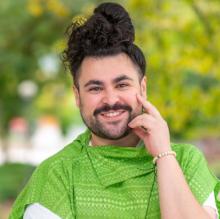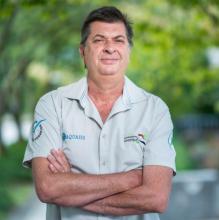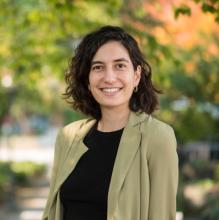The literature proposes that the evidence-to-policy gap exists partially because academics have an incomplete understanding of how policies are actually made. We understand the problem as a deficit of information and certainty and focus our knowledge-to-action (KTA) efforts mostly on knowledge dissemination and communication. But the real world of environmental policy is much more complicated. Policy making is not a linear, technocratic, merely bureaucratic process. It is instead strongly linked to context, culture, ideology, belief systems, and power dynamics.
Research Description
An estimated 12.6 million people die every year due to environmental factors such as air pollution or climate change - that's almost one in four deaths globally. As highlighted by the World Health Organization, tackling these ecological determinants of health is the biggest global health opportunity of this century. And yet, the response by governments remains inadequate to the urgency and scale of the problem that the evidence suggests. Carbon emissions continue to rise and the world seems to be following the ‘business as usual’ pathway. The literature proposes that the evidence-to-policy gap exists partially because academics have an incomplete understanding of how policies are actually made. We understand the problem as a deficit of information and certainty and focus our knowledge-to-action (KTA) efforts mostly on knowledge dissemination and communication. But the real world of environmental policy is much more complicated. Policy making is not a linear, technocratic, merely bureaucratic process. It is instead strongly linked to context, culture, ideology, belief systems, and power dynamics. These are the raw political processes that complicate the path from evidence to policy. In order to address these political realities, I hypothesize that academics should be encouraged to embrace strategies such as lobbying and social movement activism. Yes, these strategies are seen as undesirable in the current academic context and their uptake has been limited. But they do present an evidence-based approach to KTA on a policy level. The key questions that guide my research are therefore: How can we as academics better bridge the evidence-to-policy gap to safeguard our environment? Under what circumstances can the framing of environmental issues as a threat to human health live up to its potential as a successful strategy to impact policy? What can we learn from thought leaders who have pushed the boundaries of what is perceived as ‘worthy’ scholarship and have successfully shaped environmental policy by embracing their role as activists? And how must the understanding of the role of academia evolve in order to provide an environment that allows researchers to engage in such political KTA efforts?
What does being a Public Scholar mean to you?
Public scholarship is the reason why I decided to pursue a PhD – I not only aspire to be a public scholar, I also essentially research how to be one. I left a promising clinical career because I was determined to contribute to change on a systemic level. I still believe that conducting and implementing impactful research is a wonderful way to do so – if we actually succeed in mobilizing our research beyond the world of academia. I have never wanted to become an empirical researcher who describes a problem and issues yet another call to action that goes largely unheard. Instead, I want to learn from other change makers and thought leaders who have dared to think outside the box of what is possible in terms of mobilizing evidence into policy as academics. It is not always easy to ‘swim against the tide’ by trying to change the culture and norms of a traditional behemoth such as academia. By being a part of the PSI, I am able to connect with others who have similar goals and visions. I feel supported and valued for my ideas. The PSI, as a university-based initiative, gives me hope that the change I hope to see is indeed possible!
In what ways do you think the PhD experience can be re-imagined with the Public Scholars Initiative?
In the face of massively urgent threats such as climate change, the times of doing research for research’s sake must be over. Indeed, I believe that most emerging scholars come to the PhD program with an intrinsic motivation to contribute to the public good. But then they are faced with constraints and barriers inherent to an outdated culture within the academy. Publishing in the peer-reviewed literature and receiving prestigious grants should not be the end-all be-all to our work! This ‘currency’ of academia is of limited use to those of us who seek to remain in academia but wish to create actual impact. Those of us who aim to find employment out in the real world remain utterly unprepared by this current approach. My hope is that with programs such as the PSI, the academy can bid farewell to its outdated model of identifying as a ‘value-free producer of knowledge’ and can instead fully embrace its role as a public institution that has a responsibility and mandate to contribute to the public good. There needs to be a third pillar besides research and teaching that characterizes modern universities: that of producing change makers for the real world! Thanks to the PSI and other thought leaders, this cultural shift has been sent underway and I am excited to join this movement.
How do you envision connecting your PhD work with broader career possibilities?
I hope to become part of a new generation of academics who are agents of change and push the boundaries of what an academic degree and career may look like. I want to apply the skills that I acquire during this PhD program and work in a leadership and/or consultant capacity with organizations and support them in developing their change-making strategies to influence environmental policy making. I get very excited when I can help organizations uncover their visions and missions, their theories of change, and their expedient strategies. Further down the road, I can maybe see myself bringing my expertise and connections back to academia by becoming a ‘pracademic’ – a practitioner-academic with one foot in academia and the other out in the real world of climate policy making and shaping. Therefore, my expectations and hopes for my PhD go beyond allowing me to prepare for an academic career; I would also like it to prepare me for a career as a KTA/strategic consultant and environmental policy advocate.
How does your research engage with the larger community and social partners?
My PhD research is about how to create change. However, I am aware that merely researching how it can be done does not mean that my findings will actually contribute to change. With the help of the PSI, my PhD project does not end there. I am creating an integrated KTA component of my PhD which allows me to put my findings into practice by working directly with researchers and funders who want to mobilize health evidence into climate policy more effectively. Together with my community partners, the Pacific Institute for Climate Solutions (PICS) and the Planetary Health Alliance (PHA), I will co-develop a training for and strengthen an organized network of researchers who aim to improve their KTA skills and ultimately want to have an impact on climate policy. Finally, I hope to co-develop, with my community partners, guidelines for funding agencies who seek to fund impactful KTA plans and strategies with regards to the environmental impacts on human health.
Why did you decide to pursue a graduate degree?
After a very brief stint as a student of political science in Germany many years ago, I switched careers, went to medical school, and worked as a psychiatrist in Switzerland for several years. However, my passion for policy and politics never ceased and I became increasingly frustrated with the limited impact that I had as a clinician on the systemic issues that made my patients sick. Therefore, I made the decision to leave my clinical career path and come to Canada to complete an MSc in Population and Public Health at UBC. I became very interested in how the framing of environmental policy as a human health issue may open up pathways for academic environmental advocacy and how evidence can be used to create policy change. Fast forward another couple of years and here I am, now a PhD student at IRES, exploring ways in which academics conduct KTA activities in the environmental policy realm.
Why did you choose to come to British Columbia and study at UBC?
I have traveled, studied, worked, and lived in almost 30 countries but I decided to remain at UBC for my doctoral research because it provides me with an unparalleled opportunity to conduct my action-oriented research program. UBC was recently ranked as the world’s leading university in climate action, speaking to its existing infrastructure and political will in this field. Having already completed my MSc degree in Population and Public Health in collaboration with UBC SEEDS, I have an existing interdisciplinary network of experts and change makers that I can now turn to for this PhD program. Moreover, UBC provides cutting-edge opportunities for emerging scholars who are interested in working at the intersection between the academy and the ‘real world’ through the PSI. I want to graduate from the program not only equipped with profound research skills but also surrounded by a network of people with whom I would like to stay connected for many years to come. The collaboration with my community partners certainly gives me the opportunity to develop such lasting relationships. Finally, I consider my supervisors Dr. Paul Kershaw, one of Canada’s leading experts in health political science and its practical application to large scale public health issues and Dr. David Boyd, UN Special Rapporteur on Human Rights and the Environment, my mentors and I enjoy learning from and with them.
What is it specifically, that your program offers, that attracted you?
The Institute for Resources, Environment, and Sustainability is truly interdisciplinary. The breadth and depth of the knowledge present among the students, staff, and faculty never cease to amaze me. We constantly learn from and support each other which is wonderful.
For you, what was the best surprise about graduate life, about UBC or life in Vancouver?
At UBC, I was surprised by the energy and will to create change. In Vancouver, I am still surprised by the sunny days that break up rainy periods ;-).
What aspects of your life or career before now have best prepared you for your UBC graduate program?
Perseverance and the unyielding motivation to learn and become part of the solution.
Do you have any tips for students from your home country coming to Canada / to UBC Grad School?
Widen your horizon and do not focus all your time and energy on your studies. Branch out and take/audit courses in other faculties; make use of the ample opportunities to get involved both on campus and beyond; and strive to become a well-rounded scholar with superb people and leadership skills.
Public scholarship is the reason why I decided to pursue a PhD – I not only aspire to be a public scholar, I also essentially research how to be one. By being a part of the PSI, I am able to connect with others who have similar goals and visions. I feel supported and valued for my ideas. The PSI, as a university-based initiative, gives me hope that the change I hope to see is indeed possible!




